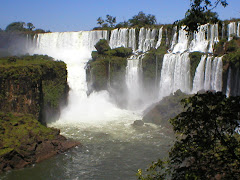It would appear as I ask this question that the world is divided into a few camps on the purpose and relevance of religion. What got me here was an intensive course on Max Sackhouse's in-depth coverage of "God and Globalization" or the theological and moral basis of of global business. Max's camp would seem to believe that religions inform societies' meaning-making by establishing the values, morals and ethics by which those societies operate. He contends that, in fact, all societies are based in religious beliefs (even lumping Marxist/Communist countries in under that umbrella). So to Stackhouse the real purpose of religion is to define the rights and wrongs for societies so that they might come together and work together with some mutuality.
There are those also whose belief seems to be that the purpose of religion is to scare people into submission. These people hold a Machiavellian belief that the rich and powerful created dogma and doctrine to oppress the masses, and while there have been periods of history where that appears to be true, I do not think that over time this is a true purpose. To be sure religion is powerful and power will corrupt. So there have been Pastors and Popes who have sought personal gain from the institution of religion. But these are aberrations.
Yet a third camp feels that religion's purpose is to assuage the pain of being human just living this broken life. Life is pain and we seem to have evolved to this place where pain is neither allowed nor accepted as part of it. So religion comes to the rescue like some great vile of Prozac or Percoset (I don't know which is worse). Prayer and meditation are supposed to place you in the loving arms of the benevolent who will make it all better. Or at least that what it seems like from this side.
Then there is this little island of people (I audaciously assume that there are others) who believe that the purpose of religion is to teach and develop - actually, to provide the tools that teach and develop us as humans on this wacky trip of life. From this perspective, I admit that life is pain (and joy, yes, but lots of nasty painful things happen) and I admit that there are forces and powers far greater than we are and with each of these we must cope, no doubt. How? That is the operative question. Unlike Stackhouse, I do not believe that any religion can map out all of the scenarios that provide a handy dandy rule book of right/wrong. So into the gray and unknown and painful and powerful we venture - but not alone. Taken as lessons, the pains, our "sins" or our foibles, the forces of nature can be seen as things that teach us who we are and how we are to be with each other. Failure is the greatest teacher - think of it. And Jesus, as far as I can tell, never once got mad at or chastized a "sinner" or a fallen person or someone caught doing something "wrong.". The only people he called out were the self-righteous!
Sacred texts are most often inclusive of confusing and contradictory stories. Of course they all contain the obligatory short list of do's and don'ts but the bulk of them are life stories of men and women struggling into the void of not knowing - not, however, as examples - but as case studies meant to force our thinking to adapt. Like the koan, most of these stories don't have an obvious answer. They force us to think. And that I believe is the real purpose of religion - to force us and guide us to thinking and acting in an ever-adaptive and spiritually grounded way. It is not the easy interpretation (rules are a lot simpler way - just tell me what to do) but it works for me.
Thursday, October 16, 2008
Subscribe to:
Post Comments (Atom)
.jpg)



No comments:
Post a Comment